A sad, subdued Nowruz for Syria’s Kurds
Mourning the people killed in February’s massive earthquakes, the community gets together for a toned-down celebration.
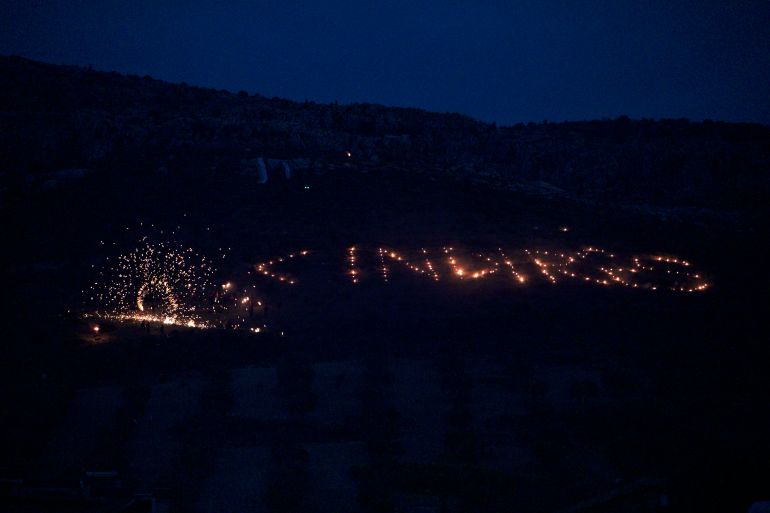
Basouta, Syria – Syrian Kurds in the northwestern, opposition-controlled Afrin region have welcomed the first day of spring with a subdued Nowruz celebration this year, as they mourn those killed in the earthquakes that struck northern Syria and southern Turkey on February 6
An initial earthquake, followed by another one nearly as strong, along with hundreds of aftershocks, left the region in shock, caused tens of thousands of deaths and damaged large swaths of both countries.
Keep reading
list of 3 itemsFloods destroy homes of quake survivors in northwestern Syria
Syria’s Assad in UAE for second post-quake Gulf visit
Nowruz marks the beginning of a new year across a number of countries and communities, including Afghanistan, Iran, India, Syria, and Turkey. It is often referred to as Persian New Year and has been honoured on UNESCO’s list of Intangible Cultural Heritage of Humanity since 2009.
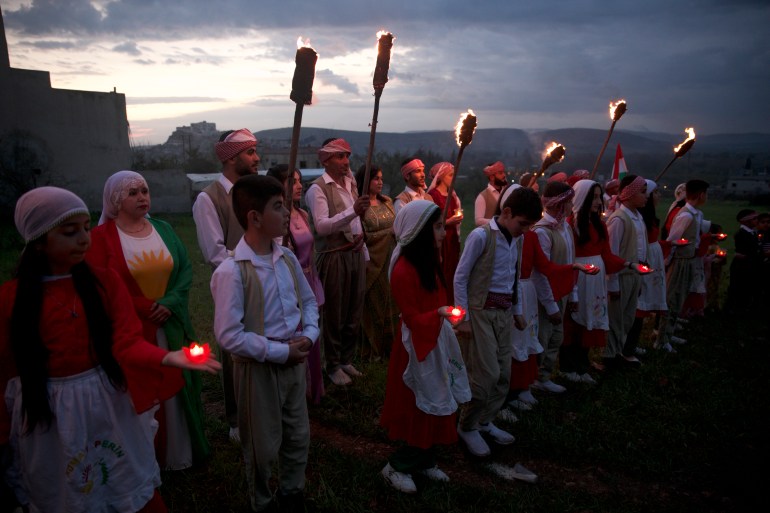
A symbol of freedom and peace
Idris Rasool, a 26-year-old father of one, told Al Jazeera that, for Kurds, the new year’s Nowruz celebrations are an occasion to get together and renew bonds between people as well as a symbol of freedom and peace.
“We celebrate Nowruz every year on two specific days. On the morning of March 20, we prepare the necessary equipment to start the fires before we light them at sunset, accompanied by playing popular Kurdish songs and dancing to them. On the 21st, we hold gatherings and celebrations,” Rasool said, holding his young daughter in his arms.
“This year, we cancelled the celebrations that we used to hold on Nowruz because of the catastrophe in Syria and Turkey following the devastating earthquake last month, and we wanted to paint a mural expressing our grief for the earthquake victims,” Idris said.
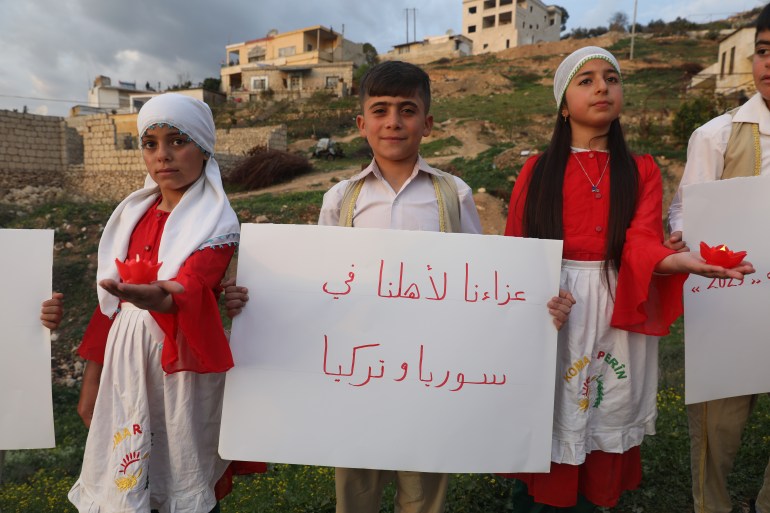
Typically, on the night before Nowruz, the celebration starts with lighting bonfires at the tops of hills and mountains to symbolise historical victories and liberations, as well as the defeat of darkness.
“The fire is a symbol of freedom and peace, and it is a custom followed by Kawa Haddad, who set fires after defeating King Dahhak, who used to kill the Kurds and oppress them,” said Fadelah Hassan, a 49-year-old mother of four from Basouta, referring to the Kurdish tale of a brave blacksmith who defeated an evil and bloodthirsty mythological tyrant.
Legend has it that to celebrate the victory of Kawa’s army, women donned their brightest dresses and everyone sang and danced around the flames of their liberation. And once Kawa defeated the evil king, fruit and vegetables began to grow again, rivers flowed, and birds and wildlife returned to the lands of Mesopotamia, a day marked since then by the Nowruz celebrations welcoming a new year.
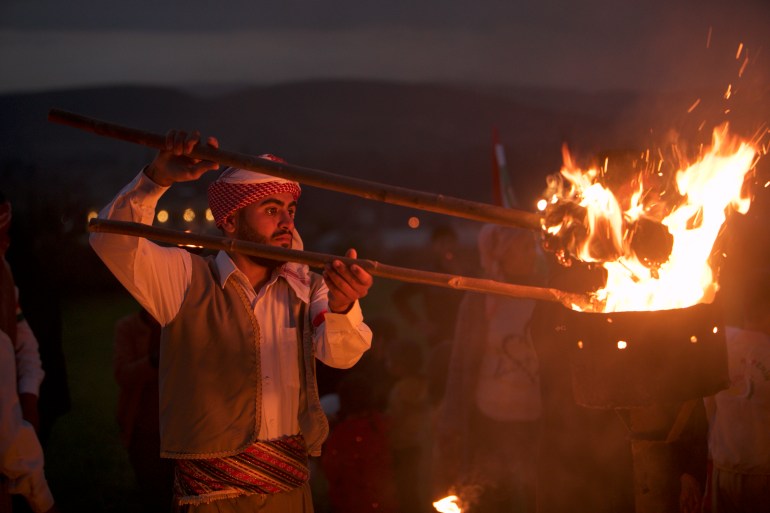
Beautiful coincidence
Someone else was welcomed on Nowruz five years ago: Little Aya who was celebrating her turning five with a simple cake and candles.
“This is the most beautiful coincidence that happened to me, that my daughter came on the same day that we celebrate Nowruz,” said Badia Mamo, Aya’s mother.
Mamo told Al Jazeera that although the celebrations were this year to mourn the earthquake victims, she wanted to celebrate her daughter’s birthday with everyone that night.
“We’re trying to bring some happiness to our children by celebrating my daughter’s birthday among the people, even if it is with a little piece of cake,” said Badia.
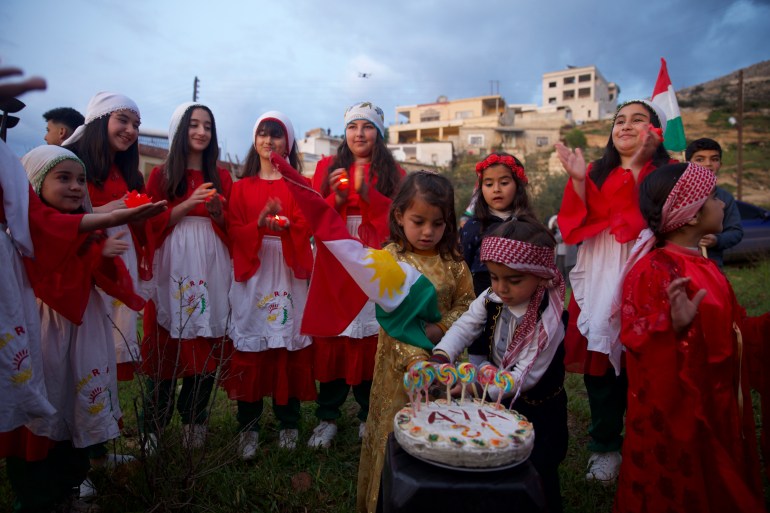
The Kurds have not always celebrated Nowruz in the open. The governments of Syria, Turkey and Iraq, fearing Kurdish nationalism, had banned the celebration of Nowruz among their Kurdish minorities in the past.
“The [Syrian President Bashar] al-Assad regime was closing in on us in Nowruz and preventing us from practising the rituals of this holiday, so we used to celebrate it inside our homes, each of us with our families,” said Hassan.
“Nowruz and lighting a fire on this day symbolises salvation from injustice and tyranny,” said 55-year-old Juma Hassan. “It is the beginning of a new page for all the peoples of the region in order for us to join hands, respect each other, and share our concerns, whether we are Kurds, Arabs, or Turks.”